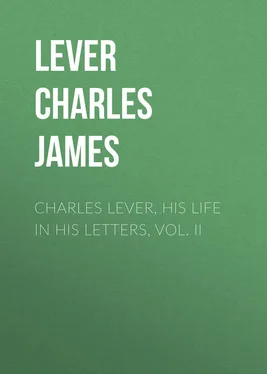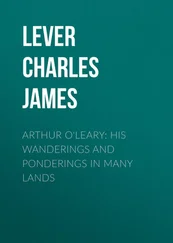Charles Lever - Charles Lever, His Life in His Letters, Vol. II
Здесь есть возможность читать онлайн «Charles Lever - Charles Lever, His Life in His Letters, Vol. II» — ознакомительный отрывок электронной книги совершенно бесплатно, а после прочтения отрывка купить полную версию. В некоторых случаях можно слушать аудио, скачать через торрент в формате fb2 и присутствует краткое содержание. Жанр: foreign_antique, foreign_prose, на английском языке. Описание произведения, (предисловие) а так же отзывы посетителей доступны на портале библиотеки ЛибКат.
- Название:Charles Lever, His Life in His Letters, Vol. II
- Автор:
- Жанр:
- Год:неизвестен
- ISBN:нет данных
- Рейтинг книги:5 / 5. Голосов: 1
-
Избранное:Добавить в избранное
- Отзывы:
-
Ваша оценка:
- 100
- 1
- 2
- 3
- 4
- 5
Charles Lever, His Life in His Letters, Vol. II: краткое содержание, описание и аннотация
Предлагаем к чтению аннотацию, описание, краткое содержание или предисловие (зависит от того, что написал сам автор книги «Charles Lever, His Life in His Letters, Vol. II»). Если вы не нашли необходимую информацию о книге — напишите в комментариях, мы постараемся отыскать её.
Charles Lever, His Life in His Letters, Vol. II — читать онлайн ознакомительный отрывок
Ниже представлен текст книги, разбитый по страницам. Система сохранения места последней прочитанной страницы, позволяет с удобством читать онлайн бесплатно книгу «Charles Lever, His Life in His Letters, Vol. II», без необходимости каждый раз заново искать на чём Вы остановились. Поставьте закладку, и сможете в любой момент перейти на страницу, на которой закончили чтение.
Интервал:
Закладка:
“‘The Times’ on ‘Tony’ was miserable: the book is – ‘though I that oughtn’t,’ &c, – good. That is, there is a devilish deal more good in it than half of the things that are puffed up into celebrity, and had it been written by any man but my unlucky self, would have had great success. I have not seen the M. P. notice. I have just seen the ‘P. Mall Gazette.’ It is deplorably bad: the attempts at fun and smartness positively painful. I am impatient to hear what you say of the new story.”
To Mr John Blackwood.
“Villa Morelli, Feb. 21,1865.
“I hasten to answer your note, which has just come and relieved me of some gloomy apprehensions. I had begun to fancy that your delay in pronouncing on B. F. is out of dislike to say that you are not pleased with it. This fear of mine was increased by being low and depressed. Your judgment has relieved me, however, and done me much good already, and to-morrow I’ll go to work ‘with a will’ and, I hope, a ‘way.’
“‘The Judge and his Wife’ 4 4 Baron Lendrick (in ‘Sir Brook Fossbrooke’) was one of Lever’s favourite characters. The old judge was a sketch for which he had to depend upon a memory of a journey made more than twenty years before ‘Sir Brook’ was written. Lever had travelled to London in the ‘Forties with a distinguished party – Isaac Butt, Frederick Shaw (the member for Dublin University), Henry West (afterwards a judge), and Sergeant Lefroy (afterwards – Lord Chief-Justice of Ireland). Baron Lendrick was a study of Lefroy. It was said that Lever was the only man who had ever succeeded in making Lefroy laugh. Lever declared that his Baron Lendrick was a portrait upon which he had expended “a good deal of time and paint” – E. D.
are life sketches, the rest are fictional.
“I send you a batch of O’Ds. for April No. Some of them I think good. By the way, Smith – of Smith & Elder – has been begging me to send him something, as O’Ds. I refused, and said that Cornelius was your property, and if I sent him an occasional squib it should be on no account under that title.
“From what I have seen I agree with you about the style and pretensions of the ‘P. M. Gazette.’ They are heavy when trying to be light and volatile, the dreariest sort of failure imaginable. It is strange fact that what the world regards as the inferior organisation – the temperament for drollery – is infinitely the most difficult to imitate. Your clown might possibly play Hamlet. I’ll be shot if Hamlet could play Clown! Now original matter on daily events, to be read at all, ought to have the stamp of originality on its style. These fellows have not caught this. They are as tiresome as real members of Parliament.
“There is a great dearth of ‘passing topics’ for O’Dowderie; Parliament is dull, and society duller. I am sure that a little stupidity – a sort of prosy platitude just now in O’D. – would conciliate my critics of the press. My pickles have given them a heartburn, d – them; but they shall have them hotter than ever.”
To Mr John Blackwood.
“ Feb . 29, 1866.
“I have just got your note and its ‘farce’: thanks for both. ‘Tony Butler’ is a deal too good for the stupid public, who cram themselves with [] and [ ], which any one with a Newgate Calendar at hand and an unblushing temperament might accomplish after a few easy lessons.
“It is very little short of an indignity for a man to write for a public who can gloat over [] or the stupid drolleries of [ ], so flauntingly proclaimed by ‘The Times,’ as most utter trash. I am decidedly sick of my readers and my critics, and not in any extravagance of self-conceit, because though I know I have a speciality for the thing I do, I neither want any one to believe it a high order of performance or myself a very great artist. I only say it is mine, and that another has not done it in the same way.
“I shall be sorry if you omit the O’Ds. this month. Two of them, at least, are apropos, and would suffer. The careful meditation, too, is worth something, as I claim to be ready with my pen, even when I only wound my bird.”
To Mr John Blackwood .
“Villa MorElli, Florence, March 7, 1865.
“I answer your note at once to acknowledge your cheque. It’s not necessary to tell you how I value your feeling for me, or how deeply I prize your treatment of me. Sorely as I feel the public neglect of ‘Tony,’ I declare I am more grieved on your account than on my own. It is in no puppyism I profess to think the book good: faults I know there are, scores of them, but there is more knowledge of men and women and better ‘talk’ in it, I honestly believe, than in those things which are run after and third-editioned. As to doing better – I frankly own I cannot. It is not in me. I will not say I may not hit off my public better, though I’m not too confident of even that , but as to writing better, throwing off more original sketches of character, – better contrasts in colour or sharper talkers, – don’t believe it! I cannot.
“A more ignorant notice than the ‘Saturday Review’ I never read. M’Caskey is no more an anachronism than myself! though perhaps the writer of the paper would say that is not taking a very strong ground.
“Why don’t you like the ‘Rope Trick’? It is better than most of the O’Ds. By the way, Smith only asked if I would send him O’Dowderies, and I misrepresented him if I conveyed anything stronger. I was not sorry, however, at the opportunity it gave me to say – how much and how strongly – I felt that they were yours so long as you cared for them. You had been the godfather when they were christened.
“I am half disappointed we don’t start B. F. next month; but you are always right, – perhaps even that makes the thing harder to bear.
“‘Piccadilly’ is very good, very amusing; one thing is pre-eminently clear, the writer is distinctively a ‘gentleman.’ None but a man hourly conversant with good society could give the tone he has given to Salon Life. It has the perfume of the drawing-room throughout it all, and if any one thinks that an easy thing to do, let him try it – that’s all
“What you say of ‘Our Mutual Friend’ I agree with thoroughly. It is very disagreeable reading, and the characters are more or less repugnant and repelling; but there are bits, one especially, in the last No., of restoring a drowned fellow to life which no man living but Dickens could have written. I only quote ‘Armadale’ for the sake of the Dream Theory: it is an odious story to my thinking, and I never can separate the two cousins in my head, and make an infernal confusion in consequence. How good ‘Miss Marjoribanks’ is – how excellent! What intense humour, what real knowledge of human nature! To my thinking she has no equal, and so think all my womanhood, who prefer her to all the story-writers, male and female.
“What you hint about a real love-story is good, but don’t forget that Thackeray said, ‘No old man must prate about love.’ I remember the D. of Wellington once saying to me, referring to Warren’s ‘Ten Thousand a-Year’: ‘It is not that he never had ten thousand a-year, but he never knew a man who had.’ As to writing about love from memory, it’s like counting over the bank-notes of a bank long broken. They remind you of money, it’s true, but they’re only waste-paper after all.”
To Mr John Blackwood.
“Villa Morelli, March 11,1865.
“I send off by book-post the O’D. proof, though I suppose, and indeed hope, you will not use them for the April No., but keep them for May. This, not alone because it will give me more time to think of ‘Sir B.’ but also, because there is just now rather a dearth of matter for what the ‘Morning Post’ describes as my ‘Olympian platitudes.’
Читать дальшеИнтервал:
Закладка:
Похожие книги на «Charles Lever, His Life in His Letters, Vol. II»
Представляем Вашему вниманию похожие книги на «Charles Lever, His Life in His Letters, Vol. II» списком для выбора. Мы отобрали схожую по названию и смыслу литературу в надежде предоставить читателям больше вариантов отыскать новые, интересные, ещё непрочитанные произведения.
Обсуждение, отзывы о книге «Charles Lever, His Life in His Letters, Vol. II» и просто собственные мнения читателей. Оставьте ваши комментарии, напишите, что Вы думаете о произведении, его смысле или главных героях. Укажите что конкретно понравилось, а что нет, и почему Вы так считаете.








![William Frith - John Leech, His Life and Work. Vol. 1 [of 2]](/books/747171/william-frith-john-leech-his-life-and-work-vol-thumb.webp)

![William Frith - John Leech, His Life and Work, Vol. 2 [of 2]](/books/748201/william-frith-john-leech-his-life-and-work-vol-thumb.webp)

